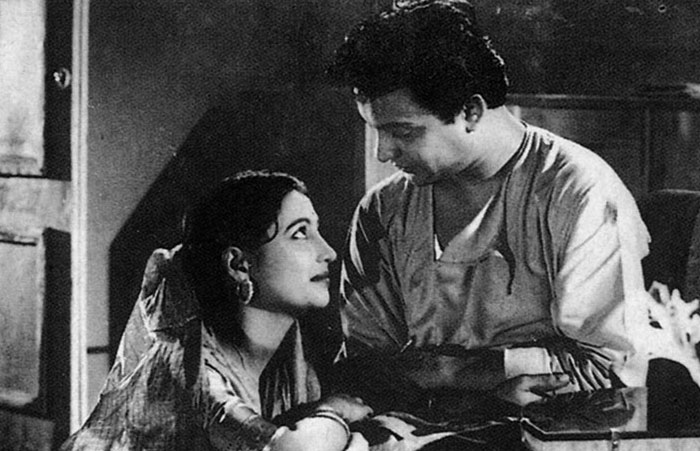An amnesiac after a train accident, Alok Mukherjee (Uttam Kumar), is rescued on escaping from the asylum, where he is admitted, by doctor Roma Banerjee (Suchitra Sen). Roma then takes him to her father’s (Pahari Sanyal) country house in a village called Palashpur. There, while treating him, she falls for him and he for her. They marry but a second accident makes him recall his life as a rich businessman in Calcutta and he forgets the memories spent with Roma. Roma follows him to Calcutta and meets him there but he doesn’t recognise her. He hires her as a governess to his niece instead. Roma keeps trying to stimulate Alok’s memory but is looked at suspiciously by Lata, Alok’s fiancee in Calcutta, who thinks Roma is snatching Alok away from her. She complains to Alok’s mother who has Roma kicked out. Roma returns to her father. Alok, realizing she is from Palashpur and that is where he got back his memory, goes to Palaspur and regains his memory of times spent with Roma there. All’s well that end well, finally.
In the 1950s and 1960s, the three most vital people to have working in a Bengali Film to ensure its success were superstars Uttam Kumar, Suchitra Sen, and Hemanta Mukherjee to give music for the film. Harano Sur has all three working in the film and they ensure it is one of their more memorable collaborations together. The film, produced by Uttam Kumar, is unabashedly inspired by Mervyn LeRoy’s soppy melodrama, Random Harvest (1942), that starred Ronald Colman and Greer Garson. Moinak Biswas in the write up The Couple and Their Spaces: Harano Sur characterizes the film as a domestic melodrama of a ‘subordinate woman winning over her boss’s heart in the genre of english novels such as Richardson’s Pamela.’
Harano Sur is directed by Ajoy Kar, a cameraman and director. Kar shot over 80 feature films before becoming a director with the Sabhyasachi collective. The collective included Binoy Chatterjee (script), Jatin Datta (sound), Kamal Ganguly (editor), Bishnu Chakraborty (art direction) and actress Kanan Devi. In fact, he signed his first three films as Sabhyasachi. Kar was a crucial figure in Bengali cinema of the 1950s and 60s starring Uttam Kumar and made several films based on novels of Tagore and Sarath Chandra Chatterjee. Harano Sur and Saptapadi (1961) are his most famous films with Uttam Kumar and Suchitra Sen while he directed Suchitra Sen in her award-winning Saat Pake Bandha (1963) as well.
Admittedly, the film has dated though these type of weepy women’s pictures were quite popular in mainstream Indian Cinema in the 1950s and 60s. But what remains ageless and takes prominence over everything else in the film, especially given its contrived premise, is the absolutely magical chemistry between the two leads. Harano Sur showcases the Uttam Kumar-Suchitra Sen pair at their best. It is easy to see looking at this film and the delirious romanticism of their scenes together as to why why this pair was regarded to be primarily responsible for the golden age of Bengali Cinema as they went on to become icons of Bengali romantic melodramas for more than twenty years, becoming almost a genre into themselves. They manage to make the film emotionally involving in spite of its medical loopholes and amnesia mumbo jumbo, thereby lifting the story to a rather engrossing psychodrama. In fact, Harano Sur was one of the major films with which Sen developed her cult image in Bengali Cinema as the embodiment of the ultimate self-sacrificing Bengali woman. Yes, it would be regarded as highly regressive today but one has to remember the era the film was made in. And to be fair to Sen’s character, she is actually a strong and determined young woman who goes after what she wants – in this case her husband and his love.
Coming to rest of the cast, Pahari Sanyal, solid as ever, lends perfect support as Suchitra’s understanding and always supportive father and it is interesting to see Utpal Dutt in an early role of a psychiatrist at the Asylum from where Uttam Kumar escapes.
With Kar behind the camera as well, the film boasts of some very fine evocative black and white cinematography with some splendid use of light and shadow. Special mention must be made of Suchitra Sen’s ethereal close ups (she had a face made for close ups!) and the lavishly mounted scenes of romance of the lead duo against beautiful landscapes and richly decorated interiors with fluttering curtains, incense and such mnemonic objects as bunches of tube roses that heighten the poetic mood of the love story.
The music by Hemanta Mukherjee is remarkable, especially for the key number Tumi Je Amar. The song is one of the most haunting and lilting Bengali songs ever put over by Geeta Dutt, whose unique, silken voice suits Suchitra Sen perfectly. The refrain of the song, sung by Roma at her and Alok’s wedding, is used repeatedly as a plot device as Roma tries to make Alok remember their marriage and his time spent with her. The song was re-worked by Hemanta Mukherjee as a duet with him and Geeta Dutt – Chale Hum Kahan in the Hindi film Police (1958) but did not quite having the same impact in Hindi.
All in all, Harano Sur is a classic film that is a true reminder of the golden age of Bengali cinema.
Bengali, Drama, Black & White



Shuchitra-Uttam – the most glamorous and powerful romantic heroine and hero live forever! They represent the true essence of Bangla- Epar Bangla Opar Bangla! They represent the golden age of Bangla films which will be cherished in every souls of Bangali!